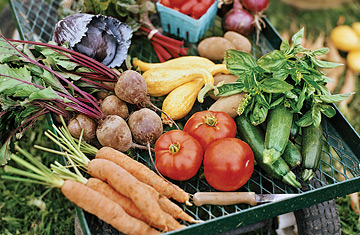
A selection of fresh vegetables from the Windflower Farm in upstate New York, near the Vermont border.
(5 of 5)
Having met Ted, Jan and their sons--and having spent the night in their barn--I trust they don't use chemicals. But the Blomgrens don't grow fruit for the CSA. They buy it from other local growers, and most of them use sprays because of the humidity. Ted's hens were free-range--they strutted around eating the grass behind his house. But pastured chickens still require some grain feed, and the grain Ted bought was mostly conventionally grown, industrially processed corn.
I was deflated to hear that I had ingested chemicals with my fruit and eggs. But at this point I threw up my hands. If I wanted total purity, the only option was to grow my own food. Forget it. Farming is dirt-under-the-toenails hard work, and the Blomgrens are by no means making a vast fortune.
But I had arrived at an answer to my question: I prefer local to organic, even with the concessions local farmers must make. I realize there's something romantic about the desire to know exactly where your food is from. Among true agrarians, that desire carries a reactionary strain, a suspicion of modernity. "Instead of relying on the accumulated wisdom of a cuisine, or even on the wisdom of our senses, we rely on expert opinion," journalist Michael Pollan wrote in last year's acclaimed book The Omnivore's Dilemma. "We place our faith in science to sort out what culture once did." But science should trump culture on matters of nutrition. The problem is that science offers no clear guidelines yet on how beneficial organic food is.
When asked years ago whether she preferred butter or margarine, Gussow famously remarked, "I trust cows more than chemists." For my part, I do not. I will still go to Whole Foods to buy the mass-produced Organic Food Bars I eat for breakfast when I don't have time for eggs. I am happy that food scientists are finding ways to produce everyday products like cereal with organic ingredients. (How about organic Froot Loops? I have a weakness for Froot Loops late at night.) But when it comes to my basic ingredients--literally, my "whole" foods rather than my convenience foods--I would still rather know the person who collects my eggs or grows my lettuce or picks my apples than buy 100% organic eggs or lettuce or apples from an anonymous megafarm at the supermarket. Choosing local when I can makes me feel more rooted, and (in part because of that feeling, no doubt) local food tastes better.
Eating locally also seems safer. Ted's neighbors and customers can see how he farms. That transparency doesn't exist with, say, spinach bagged by a distant agribusiness. I help keep Ted in business, and he helps keep me fed--and the elegance and sustainability of that exchange make more sense to me than gambling on faceless producers who stamp organic on a package thousands of miles from my home. I'm not a purist about these choices--I ate a Filet-O-Fish at McDonald's on the way to Ted's farm. But in general, I have decided that you are where you eat.
